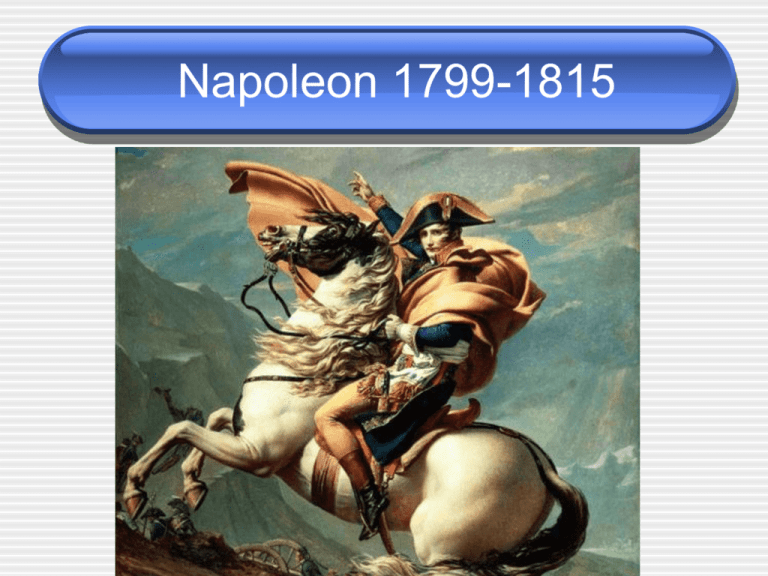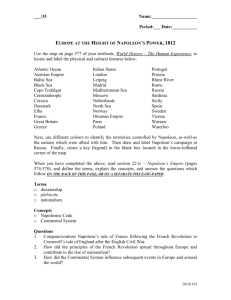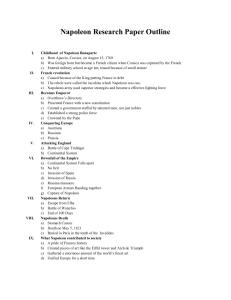Napoleon PPT
advertisement

Napoleon 1799-1815 Early Years • Born August 15, • • • 1769 on Corsica Age 10 went to Brienne military college in France At 15 went to École Militaire in Paris At 16 made an officer in army Military Success • 1793 as major, led • • Republican troops against royalists and British in Toulon Promoted to brigadier general Later jailed for being friends with Robespierre’s brother Josephine • Met and fell in love • with Josephine Six years older, husband guillotined during revolution Whiff of grapeshot • 1795 royalist • • uprising in Paris Napoleon ordered cannons fired at crowd & ended protest Promoted to major general in charge of all troops in France Italian Campaign • France attacked Italy • • to get at Austria Napoleon took over in 1796 (two days after wedding to Josephine) Great leadership & strategy defeated Austrians Egyptian Campaign • France wanted to • • • • defeat Britain Napoleon attacked them in Egypt Military failure Napoleon fled Egypt Greeted as hero in France First Consul • 1799 Napoleon overthrew the corrupt Directory ◦ Set up three-man Consulate With himself as First Consul (Julius Caesar’s Title) 1802 ◦ Consul for life 1804 ◦ Crowned himself emperor Plebiscite ◦ Popular vote done by ballot ◦ Napoleon always held plebiscites ◦ Everyone always voted for his policies Democratic despotism ◦ He had absolute power regardless of the fact that he held plebiscites Napoleon Rules France • He repaired the economy – fixed tax • • • collection, established a national bank, fired corrupt officials Lycees – started government run public schools, rewards based on merit Concordat – repairs the relationship with Church, He will claim influence but no control Established the Napoleonic Code – A system of laws that were uniform but eliminated individual rights, and restored slavery in Caribbean Code Napoleon, 1804 a It divides civil law into: Personal status. Property. The acquisition of property. a Its purpose was to reform the French legal code to reflect the principles of the Fr. Revolution. a Create one law code for France. The Influence of the Napoleonic Code Wherever it was implemented [in the conquered territories], the Code Napoleon swept away feudal property relations. Concordat of 1801 a Napoleon wanted to heal the divisions within the Catholic Church that had developed after the confiscation of Church property and the Civil Constitution of the Clergy. a But, Napoleon’s clear intent was to use the clergy to prop up his regime. Concordat of 1801 a Catholicism was declared the religion of the majority of Frenchmen. a Papal acceptance of church lands lost during the Revolution. a Bishops subservient to the regime. a Eventually, Pope Pius VII renounced the Concordat, and Napoleon had him brought to France and placed under house arrest. Emperor Napoleon • 1804 crowned himself Emperor of France Napoleon Creates an Empire • 1804 – crowned himself Emperor • Wanted territory in New World, couldn’t • • • • overcome slave armies in Haiti and sold the Louisiana Purchase to the USA Wanted to expand in Europe, other nations attacked & were defeated, signed peace treaties Austerlitz (1805) is his finest battle. He crushes the Russians and Austrians both Battle of Trafalgar (1805) – England’s Lord Nelson destroyed the French fleet, Napoleon wouldn’t be able to invade Britain Most of continental Europe in his control by 1812 Napoleonic Europe Napoleon’s Major Military Campaigns 1805: France Sea Power Britain Trafalgar (Lord Nelson: Fr. Navy lost!) Battle of Trafalgar Battles of Napoleon The Greatest Extent of Napoleon’s Empire! Napoleon’s Costly Mistakes A) Continental System – blockade against Great Britain, to destroy its economy, Britain retaliated with its own counterblockade that was more effective; Napoleon couldn’t enforce it B) Peninsular War – French marched into Spain, took over govt., Spanish guerrilla forces attacked, French army severely weakened (“Spanish ulcer”) C) Napoleon’s conquests & placing his relatives on thrones led to the rise of nationalism in the countries he conquered. The French were so hated that the people identified with their nation and rose up against the French. D) Invasion of Russia – Meant to punish Czar for selling grain to England. 1812- 600,000 + French soldiers invade Russia Russians pull back and refuse to fight, practice scorched-earth policy, and burn Moscow down. Napoleon marched back to France in winter, lost his army to the cold. 20,000 walk out… “Swallows fell from the sky like stones, frozen in flight in the bitter cold…” The Continental System a GOAL to isolate Britain and promote Napoleon’s mastery over Europe. a Berlin Decrees (1806) a “Order in Council” (1806) a Britain proclaimed any ship stopping in Britain would be seized when it entered the Continent. Milan Decree (1807) a British ships were not allowed in European ports. Napoleon proclaimed any ship stopping in Britain would be seized when it entered the Continent. These edicts eventually led to the United States declaring war on Britain WAR OF 1812. The Continental System Napoleon’s Downfall • Major powers attacked: England • • • • and Prussia 1814 – Napoleon surrendered at Liepzig, exiled to island of Elba New king unpopular, Napoleon escaped Elba, returns to France a Hero for 100 days and built a new army in 1815 Battle of Waterloo – Napoleon defeated by combined forces of Russia, Prussia, Austria Sweden and England St. Helena – Exiled until his death in 1821 Napoleon’s Defeat at Leipzig (October 16-17, 1813) “Battle of the Nations” Memorial Napoleon Abdicates! e Allied forces occupied Paris on March 31, 1814. e Napoléon abdicated on April 6 in favor of his son, but the Allies insisted on unconditional surrender. e Napoléon abdicated again on April 11. e Treaty of Fontainbleau exiles Napoléon to Elba with an annual income of 2,000,000 francs. e The royalists took control and restored Louis XVIII to the throne. Napoleon’s Abdication th “The War of the 7 Coalition” 1815: France Napoleon’s “100 Days” Britain, Russia. Prussia, Austria, Sweden, smaller German states e Napoléon escaped Elba and landed in France on March 1, 1815 the beginning of his 100 Days. e Marie Louise & his son were in the hands of the Austrians. Napoleon’s Defeat at Waterloo (June 18, 1815) Duke of Wellington Prussian General Blücher Abdication and Exile





